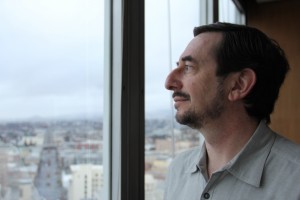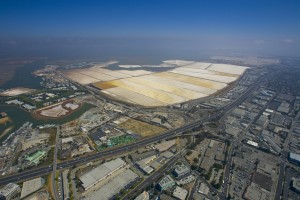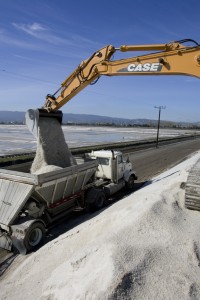
Opponents to one of the Bay Area’s largest proposed developments are not taking a back seat, despite months of silence from the developer.
Since early November, developer DMB Associates has been undergoing what it calls an “internal review” for its Redwood City Saltworks proposal.
“The applicant has asked the city to hold off on reviewing the proposal further until they make some determinations on their end, as to how they want to proceed with the project,” said Blake Lyon, acting planning manger for Redwood City. “So we’re currently awaiting further direction from the applicant.”
The most recently publicized proposal for the Saltworks development, on the east side of U.S. 101, would encompass 2.2 square miles of land that is currently being used to harvest salt. The plan would preserve half the property for open space, recreation and restoration, while developing the other half for a multi-use community with housing. The nation’s largest privately held corporation, Cargill Inc., owns the land.
The proposal recently underwent a major “scoping,” or in-depth review process, and continues to generate controversy and opposition from environmentalists and advocacy groups.
David Lewis is executive director of Oakland-based advocacy group Save the Bay, an organization that has been a vocal opponent in the public discussion surrounding the project since the beginning. Empowered with thousands of Bay Area supporters, Lewis and his staff have led a very public charge against developing the land.
The group’s grievances range from the claim that the Saltworks community would worsen traffic woes on already congested roads, to concerns about building near a shoreline that, over time, could be subject to an expected rise in sea-level. They would rather see the 1,436-acre property restored to wetlands and not developed at all. But Lewis said the primary issue is that his group does not believe the site is suitable for housing because the land is not currently zoned for that purpose.
“A proposal like this should be dead on arrival,” Lewis insisted.
In 2008, Redwood City voters struck down Measure W, an initiative pushed by Save the Bay, which would have required a majority of voters to approve certain city Council land-use decisions. In effect, the measure likely would have made it much more difficult for proposed developments like Saltworks to move forward.
Despite the measure’s failure more than three years ago, Lewis said “the project is creating its own opposition,” and he sees no evidence of new support.
The project also hits close to home for Lewis, a Bay Area native who grew up in Palo Alto. He said regional support for protecting San Francisco Bay is something Cargill and DMB underestimate. The Saltworks project would reach into the Bay, similar to existing developments, like Redwood Shores and Foster City.
“It’s just part of the regional identity, and this project is a direct — not just a direct threat to that — but an affront to it,” Lewis said. “And I think that’s why, when people learn about it, the opposition only grows.”
An internal review
While Lewis said the developers are “fighting a losing battle,” representatives of DMB Associates argue to the contrary, as they proceed with stakeholder discussions and their internal review.
A senior vice president for DMB Associates, David Smith, said though they might not be incorporating every comment received, they are giving “meaningful consideration” to every point of view.
“We’re doing our best to think about that thoughtfully and bring forward something that we hope people would see as reflective of the things they’ve asked of us,” Smith said.

Smith did not have an exact timeline for the next step, presenting a revised proposal, but said they would like it to happen as soon as possible.
“What we’re bringing forward we believe is representative of ongoing conversations with multiple stakeholder groups: from the city itself, to city residents, to environmental groups to government agencies,” Smith said. “We’ve been in contact with everybody who’ll talk to us.”
The process is “not just about getting a positive vote from a handful of elected officials,” Smith added. “If we don’t have a core group of the residents in the place in which we’re doing business, then it’s probably not going to be successful.”
To likely mitigate other roadblocks, DMB Associates hired consultants at the local, state and national levels.
“We have folks that we utilize in specific tasks, and we have ones that are just constantly watching the landscape for us for things that could impact our projects—whether it’s California Legislature, or a government agency, or locally, or just on social media,” Smith said. “We utilize a whole lot of consultants.”
Last week, DMB Associates spun off their Pacific division to create a separate San Francisco-based company, DMB Pacific Ventures, in which the Saltworks project will be housed. In a written statement, Saltworks’ spokesperson Jay Reed said this change is “intended as a strategic alignment” and that “Saltworks represents one of the company’s biggest long-term development opportunities.”
Resident retaliation
Though many area residents oppose the project, they don’t necessarily want the issue to be defined only by outside groups. Last September, a few community members formally got together and created Redwood City Neighbors United. Today, that group has grown to more than 300 people, according to the opposition group’s co-chair and longtime Redwood City resident, Dan Ponti.
“We felt that there was a need for a group that could really kind of take the perspective from Redwood City residents and bring that forward to the community and use that as a sounding board for expressing concerns about the development,” Ponti said.

Ponti cited concerns about how the project addressed traffic issues and the water supply, and he questioned how Saltworks would coexist with the city’s port and nearby heavy industries. The debate needs to be reframed, he said, adding that the largest problem is that the proposal runs contradictory to Redwood City’s General Plan, adopted in 2010.
“There was a vision in that general plan that was a community-driven process,” Ponti said.
That plan said Redwood City’s urban development should occur along existing transportation corridors and in the city’s recently revitalized downtown, according to Ponti. He said housing is not appropriate for the Cargill-owned land and believes the new development would shift the city’s growth away from the existing city center and infrastructure.
Ponti said that “the ink isn’t really even dry” on the city’s General Plan. “We should be focusing energy on implementing this. You don’t encourage infill development downtown, if you’re going to encourage a development somewhere else.”
“As part of the application the developers have requested a General Plan Amendment and Zoning Amendment,” Lyon said in a written statement. “These entitlements would need to be granted in order for the proposed project to be developed.”
While the community waits for the developer’s next move, Redwood City Neighbors United is not resting. It is still trying to gain momentum.
Echoing Lewis’ claim, Ponti said: “What we’re finding is that the more people are learning about the project, and all of the scope of the project, the less people like it.”

To clarify the reference to Measure W in the article above: This was placed on an Election Ballot a few years ago, and, if passed, would have required that anytime a developer intended to destroy any Redwood City, CA., open space or park to build something, this intention would have to go to a vote of the residents of Redwood City. Thus, the lengthy and laborious process of collecting petition signatures and fulfilling the requirements to get a measure on an election ballot would not have to take place for future issues of developing open spaces or parks in Redwood City.
An opposing ballot measure defeated Measure W with two [2] articles of “misinformation:”
A – Measure W has been crafted only to oppose the proposed Saltworks development by Cargill/DMB.
B – The homes on the northwest corner of Red Morton park on Valota & Madison would not be able to be sold since they are zoned “park land.” [The Friends of Redwood City, creators of Measure W, explained to these homeowners that in order to change the zoning of their properties from parkland, they would have to deal with the city of Redwood City, as this zoning was assigned to said land by the city in the 1940’s.]
This anti-Measure W was created by a group calling themselves “Citizens to PROTECT Redwood City.”
Measure W was never intended to be a “single issue anti-Cargill-SAltworks development” measure. And the core leaders of the Friends of Redwood City, CA., include professional environmental scientists, who, of course, serve FRC on a volunteer basis, free of any remuneration. Thank you for this opportunity to clarify “misinformation” which has lingered since the Measure W and the opposing measure was brought to a vote several years ago.